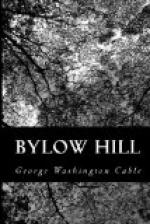At length the sister rose. “I must go to father,” she said.
The brother stood up. Their eyes exchanged a gentle gaze and tenderly contracted.
“I will come presently,” he replied, and was turning toward the water, when he paused, threw a hand toward the steep wood across the pool, and silently bade her listen.
The note he had remotely heard was rare on Bylow Hill since the town had come in below, and one of the errands which oftenest brought the hill’s dwellers to this nook in solitary pairs was to hearken for that voice of unearthly rapture,—a rapture above all melancholy and beyond all mirth,—the call of the hermit thrush.
Now the waiting seemed in vain. The brother’s hand sank, the sister turned, and soon he saw her pass from view among the boughs as she wound up the rambling path toward the three homes.
At the top she halted, still longing to hear at his side that marvellous wood-note, and was just starting on once more, when from the same quarter as before it came again, with new and fervent clearness. With noiseless foot she sprang back down the bendings of the path, having no other thought but to find her brother standing as she had left him, a rapt hearer of the heavenly strain.
She reached the spot, but found no hearkening or standing form. The young man’s stalwart frame lay prone on the green bank, where he had thrown himself the moment she had left his sight, and his face was buried in the deep moss.
The stir of her swift coming reached his ear barely in time for him, as she choked down a cry that had all but escaped her, to turn upon his back, meet her glance, and drive the agony from his face with a languorous smile. The melting song pervaded the air, but neither of them lifted a noting finger.
Leonard rose to his feet. Ruth gave him a hand and then its fellow, and as he pressed them together she said, “I wish you would go away for a time.”
He dropped one of her hands, and keeping the other, started slowly homeward; and it was not until they had climbed half the ascent that, with his most remote yet boyish smile, he replied, “I don’t think I’d better.”
VI
IN THE PUBLIC EYE
August, September, October, November,—so passed the year in gorgeous recession over Bylow Hill. Among their dismantled trees the three homes stood unveiled to the town on the meadows and to travellers who looked from train windows while crossing the river bridge. To those who inquired whose they were there was always some one more than ready to give names and details, and to tell how perfect a bond ever had been—how beautiful a fellowship was yet, now—up there.
Sevenfold they called it, although one of the seven was away; namely, Lieutenant Godfrey Winslow, of the navy, famed for his splendid behavior in the late so-and-so affair. That stately house at the right, they said, was his home what brief times the sea was not.




